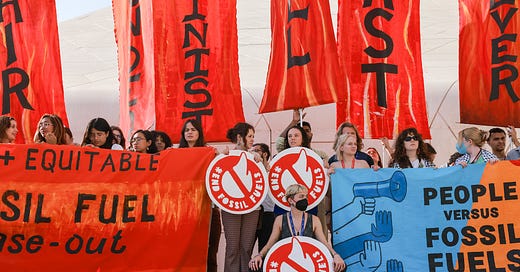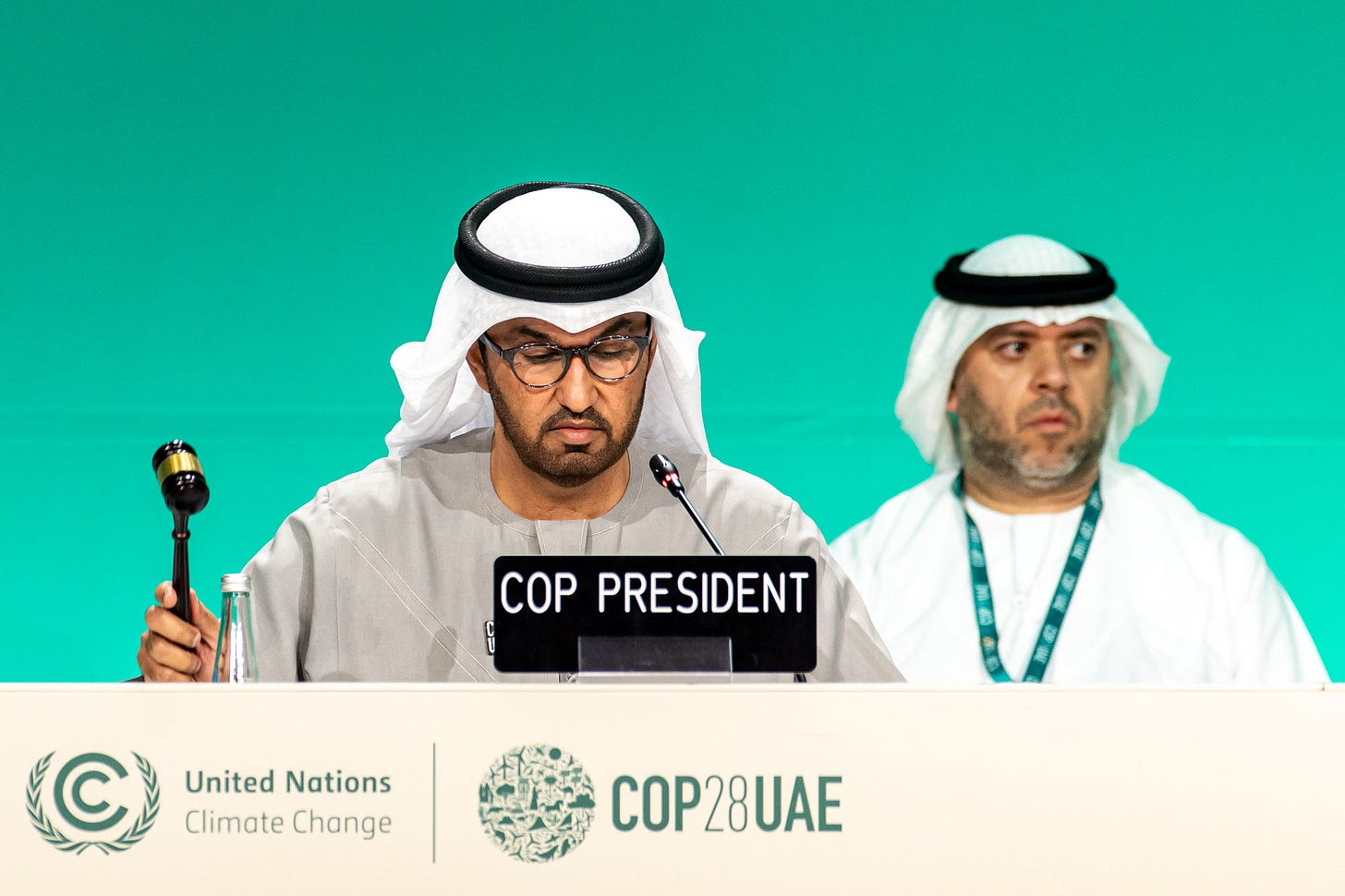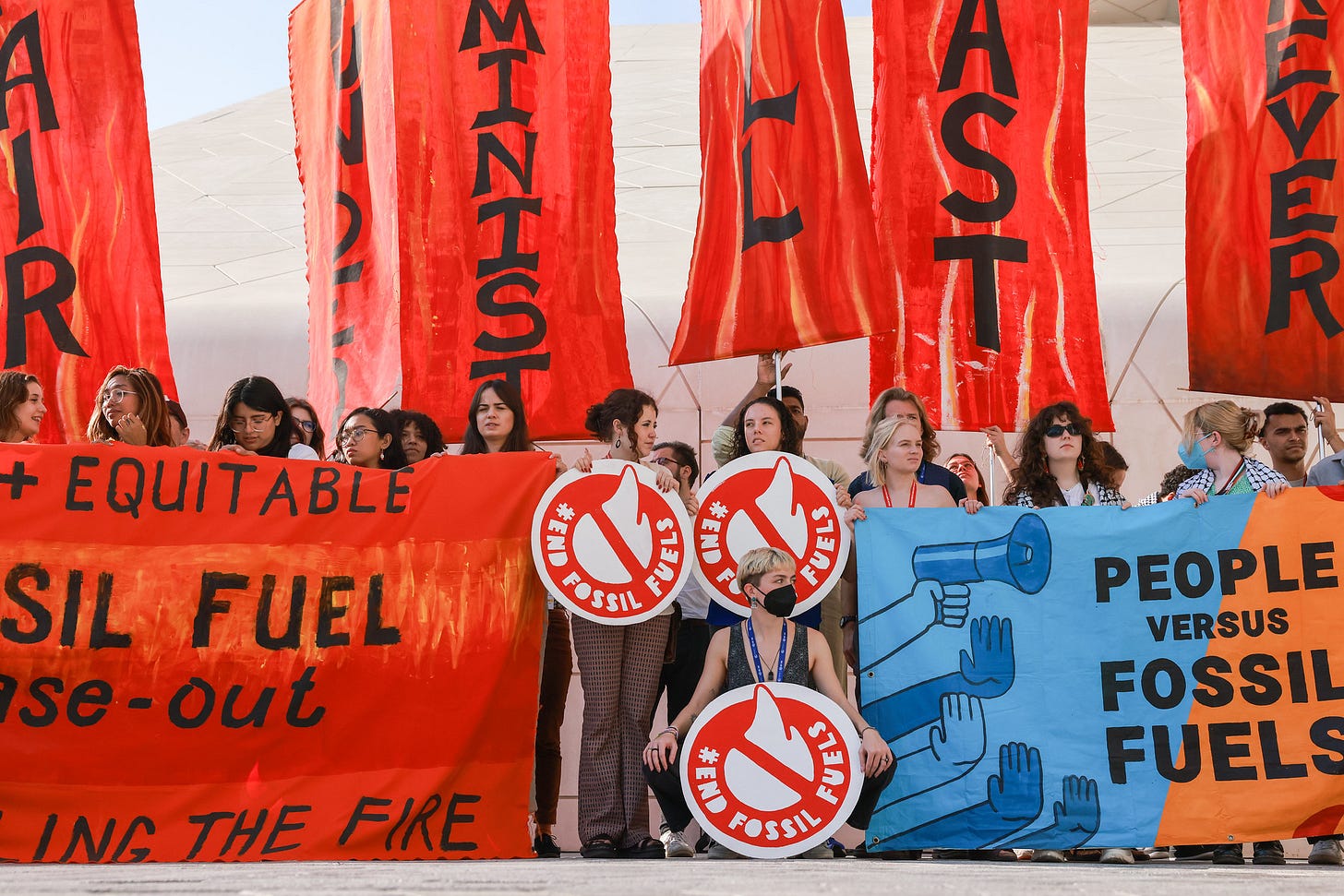15 December 2023. Economics | Climate
The socially and economically transformative case for Universal Basic Infrastructure. // How things turned out at COP28. [#525]
Welcome to Just Two Things, which I try to publish three days a week. Some links may also appear on my blog from time to time. Links to the main articles are in cross-heads as well as the story. A reminder that if you don’t see Just Two Things in your inbox, it might have been routed to your spam filter. Comments are open. And—have a good weekend!
1: The case for Universal Basic Infrastructure
The well-respected Bennett Institute in Cambridge has just released a report (pdf) making the case for what it calls Universal Basic Infrastructure, which confusingly comes with the same set of initials as Universal Basic Income. Doubly confusingly, it seems to be making a similar case as the advocates of Universal Basic Services. (They reference this idea). Sometimes I think that people trying to make the case for progressive change forget the basics of what it takes to get new ideas to stick in the public mind.
Now that I’ve finished griping, I should also nod to John Naughton’s excellent 1.1 blog, which pointed me towards the report.
This is the first sentence of the report, which sets out the policy problem they’re trying to fix:
There are too many people in the UK living in places where their economic opportunities and quality of life have fallen far behind the more prosperous parts of the country. Whether in terms of transport links or well-paying jobs or local amenities, they have been ‘left behind’. The phenomenon is both entrenched and politically significant, with the votes expressing discontent with extreme spatial inequalities described as ‘the revenge of places that don’t matter’.
It’s worse than that. Nothing that British policy makers have done, at least recently, has made any difference, and the geographic inequalities within Britain are among the starkest among the OECD countries. This is almost certainly part of Britain’s notorious “productivity problem”.
Universal infrastructure: A bus stop in Birmingham. Photo: PL Chadwick, via Geograph, CC BY-SA 2.0.)
There’s a reason for all of this. British public investment has fallen sharply since the end of the 1970s–in the period from 1979 to 2019 it was two-thirds lower than in the period from 1949 to 1978:
(T)he UK as a whole suffers from chronic underinvestment, but that long-term average net public investment fell from an average of 4.5% of GDP between 1949 and 1978 to just 1.5% between 1979 and 2019. This has had a significant, long-term effect on the state of local public infrastructure and has exacerbated regional inequality and poor productivity.
I’ll skip the obvious political point about the insidious impact of Thatcherism and/or financialisation here.
The report, ‘Townscapes’, is a policy report, and so the authors (Diane Coyle, Stella Erker and Andy Westwood) lay out their ground carefully. The first part is a set of policy questions:
what are the public and private sector infrastructure, both physical and social, that will help struggling places turn around, and thereby contribute to national economic prosperity? What is the minimum offer that everyone in every place should have, in terms of the investments that create opportunities for them to lead the lives they want?
Their proposal is for a minimum level of provision: “core local services and facilities could not be closed or reduced below minimum standards.” The point is that this provision is both collective and universal:
(W)e argue that public services must serve all of the public even if a strict Treasury efficiency calculus argues against it. Private companies providing utility-type services such as transport or broadband similarly should be required by their regulators to deliver minimum universal standards as part of their social licence to operate.
It’s a chunky report, and I’m not going to be able to do more here than point you towards it. The reason that they talk about infrastructure rather than services is because they are using infrastructure to measure service provision. They identify three types: physical infrastructure, such as bus stops or broadband wiring; public/social infrastructure such as health services and educational institutions; and private infrastructure such as cash machines and chemists. (Post offices are also on this ‘private’ list, but the sooner they become public/social infrastructure again the better.)
Public transport is essential to connect people to work, education, friends and family, cultural and leisure activities; it reduces congestion and greenhouse gas emissions; and can stimulate growth and productivity locally.... Broadband connectivity is key for facilitating economic growth and enabling access to critical public services like healthcare and education. Education is critical for individual earnings, health, promoting social mobility and enhancing economic growth. Health services are needed to create the conditions people need to thrive physically and mentally... Police stations matter for crime outcomes as the visibility of police infrastructure deters criminal behaviour. Recreational and cultural services are central to bringing people together.
As part of their research they set out to assess the provision of these kinds of services in a range of British towns, and some comparable German towns. TL:DR? Rich places in the UK have substantially more private infrastructure than poor places, and also more public infrastructure. Also, Germany is better. But one of the findings here is that the data they used is available for the whole of the UK, so it would be possible to map this for the whole country.
They talk about some of the obvious issues—some of the funding might need to be done by new financial institutions such as a National Investment Bank, for example. But there’s a bigger question for me, which is whether we can afford not to do something like this, given our pressing need to improve investment, productivity, and labour market outcomes. I suspect that if done well it would pay for itself. It might also start to rebuild public trust in politics.
They also suggest a number of other policy principles that follow from the idea of a universal minimum provision. Some of these include:
there should be a ‘preservation presumption’ especially in existing towns, smaller cities... that key services should not be closed/reduced.
UBI would need a new duty for public departments/ bodies to regularly assess need and provide accordingly.
UBI would need to establish similar duties for market regulators to make a ‘place-based’ focus a required feature of regulatory compliance.
They have a list of seven of these principles, and I would add an eighth: that compliance with UBI provision is written into public procurement contracts with the private sector. No compliance; no contracts—just to concentrate the minds of private sector executives.
In the report, they make a sharp contrast with Universal Basic Income, which isn’t geographically specific and also leaves the problem at the level of individual consumption, which is an ineffective way to deal with forms of public access:
individual incomes cannot buy a good bus service or a better school locally, and while higher income means people can spend more, the money will not be invested for the future and may not stay local. By contrast, universal basic infrastructure builds on existing policies and is by construction rooted in localities.
There’s another point here as well. Public innovation works best when it is sticky, and when it works with the grain of existing service provision and expectations. In this sense Universal Basic Income is too big a departure for policy; you just know that politicians would start fiddling with it until it broke, either accidentally or deliberately. But Universal Basic Infrastructure, like the similar but less rigorously defined proposals for Universal Basic Services, goes with the grain of a whole lot of existing provision and regulation.
2: How things turned out—and didn’t—at COP28
If you’ve been following COP28, you’ll know that there were two wins, both of which were a bit surprising, and both came with a whole lot of caveats. The first was agreement to set up a ‘loss and damage fund’, to pay for the costs of climate disasters. UAE, in the COP chair, pushed this through on the first day, to general surprise, since what’s supposed to happen is that all of the texts get agreed in increasingly long late night sessions when people are getting too tired to concentrate fully on what’s happening any more.
The second surprise: at the statement agreed at the end of the event the words “fossil fuels” appeared in a COP agreement for the first time. I’ll come to the caveats later.
Anyway, the British think-tank Chatham House had some of its team at COP, and yesterday they rolled them out on a webinar to give their impressions. Here’s my synthesis of what they said from my notes, with a little bit of commentary laced in. The experts were Anthony Froggatt, Ruth Townend, Glada Lahn, and Tim Benton.
It was the biggest multilateral meeting ever.
There were more than 100,000 people in the UAE for the event, the biggest multi-lateral event in history. Or: too big and too flabby. As a couple of the panellists said, this may not be the most effective way to address an increasingly urgent global problem.
The loss and damage fund is a step in the right direction.
But it names the geopolitical problem at the heart of COP, which is that the the countries of the global North have created the emissions, and largely continue to do so, and the global South get to experience the consequences first, but the countries of the global North keep pretending that this isn’t the case. The United States unsubtly refused to call it the loss and damge fund, using the term “climate impact response fund”. The text about this is weak and the targets are impossible to measure at the moment.
Some countries pledged some trivial amounts to the fund, but at the moment it has barely got enough money in it to cover one serious climate disaster. The World Bank is the temporary home for this fund, which is itself controversial given its record on development. And it says it will cost $200 million to get the fund up and running. I keep thinking I misheard this or misunderstood it. I’m sure it’s difficult, technically demanding, and so on, to set up a fund like this, but $200 million? You’re having a laugh, mate.
Seriously, though, nothing says “global North disdain for a public financial project that would benefit the countries of the global South” more than getting the World Bank to run it, while also charging huge fees, and since this issue goes to the heart of the mistrust that runs through the COP Climate process and the COP Biodiversity process, it’s not helpful. (Reading around this, I noticed that one of the Small Island States had accused the World Bank of “pure gangster behaviour”. Which doesn’t seem so far off the mark.)
(Dr. Sultan Al Jaber, COP28 President raises the hammer during the Closing session at COP28. Photo: UNFCCC, CC BY-NC-SA 2.0)
Fossil fuels
The thing that everyone knew about COP28 before it started was that its President, Ahmed Al-Jaber, was also CEO of ADNOC. The NOC stands for National Oil Company. So it probably was a surprise that the words “fossil fuels” appeared in the final text.
The agreed text calls on all parties to transition away from
“fossil fuels in a just, orderly and equitable manner... and in keeping with the science”.
The phrase “phase out” doesn’t appear, the text is weak, it is full of caveats, but it’s still a first step. The text has also been signed by countries whose entire economies are dependent on oil. Chatham House’s Glada Lahn saw this as a marker of change, along with the language about “just, orderly and equitable”. Fossil fuel energy accounts for 82% of energy use and 70% of emissions.
And maybe this happened because of the reaction to Al-Jaber’s ill-judged remarks ahead of COP about there being “no science” about the impact of the phase-out of fossil fuels on climate change—as a way of saving the credibility of the UAE’s COP28 Presidency. Who knows.
The other parts of the energy system have also got some attention. The text calls for a tripling of renewable production by 2030, and strong targets on increasing energy efficiency—so-called decoupling.
Food and agriculture
It was the first COP to give over a thematic day to discussing food and agriculture. This was also a departure because rather than just dealing with sources of emissions, the discussion here was of food as a system, connecting supply and demand. The food system accounts for about a third of emissions, and the statement was signed by 160 countries.
But in the global stock-take, which was an important feature of this year’s COP, food gets mentioned only in passing. Fossil fuels are discussed as part of the energy system, not as an integral part of the global fertiliser market, for example.
All the same, there are signs of change here as well. The
Alliance of Champions for Food Systems Transformation, led by Brazil, Sierra Leone and others, was visible at COP and is pushing for more assertive ways of dealing with this issue.
There’s a next of issues to be unravelled here about livestock, which accounts for 14% of emissions, and most of that comes from intensive forms of livestock farming, rather than cows sitting in fields. But certainly in the global North, governments have left food to the market, despite the increasingly large health and climate costs it generates. Tim Benton thought this might change.
Methane
A quick note on methane, which traps far more carbon in the atmosphere but doesn’t hang around for so long. It mostly comes from fossil fuels and food. 160 countries have signed the global methane pledge, including the United States, which is the third largest producer. Here technology is pretty well understood, both in terms of capturing methane at source and in monitoring emissions from satellites. If I understood the comment correctly, the EU is also introducing import rules that require imported energy to have the same methane capture standards as are required of EU producers.
(Anti-fossil fuel campaigners at COP28. Photo: UNFCCC, CC BY-NC-SA 2.0)
What next?
One of the panellists mentioned that the oil price hadn’t been affected by the inclusion of fossil fuels in the COP text, but that doesn’t seem to me to be the right measure. The oil price is driven by short- to medium-term demand and supply. A better yardstick would be its influence on the decisions of financiers and investors.
Another observed that—given the urgency of climate change—it didn’t seem likely that having an event with 100,000 people attending and 160 countries arguing line by line over text didn’t seem the best way to do it. She conjured up the idea of countries having to appear on the stage and having their progress and pledges being held to account by the others. I liked this idea—Strictly, but for climate progress—but I’m not sure that the world’s climate diplomats will be so happy about the idea.
Tim Benton closed the session by suggesting that the politics here will change, gradually, then suddenly. We’re going to pass 1.5 degrees, and more people will have greater experience of extreme weather and other climate consequences. He sees progress being made by progressive alliances of countries around specific sectoral issues changing the playing field. And he thinks that there’s a tipping point when those progressive coalitions reach about 20% of the total—which is only about 30 countries. A bit like the Alliance of Champions for Food Systems Transformation, in fact.
If you need more, Carbon Briefing looks to have the best detailed coverage of COP outcomes.
Other things: Music
Long standing readers might remember that I produce an annual ‘off centre’ playlist of seasonal music on Spotify, and this has just dropped, as I believe people say. It’s a mix of Christmas and winter music, but without the songs you’ll hear in a shopping mall. This year it’s also safe for work, and kids.
If you get excited by this, 2022 is here, and 2021 is here. Enjoy!
j2t#525
If you are enjoying Just Two Things, please do send it on to a friend or colleague.





